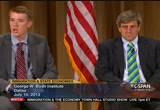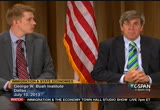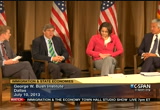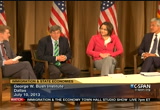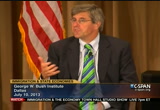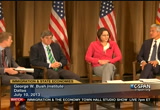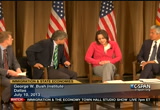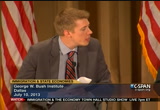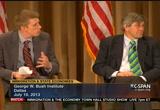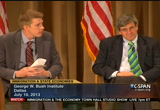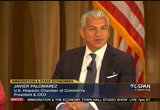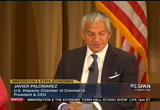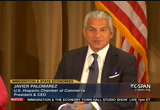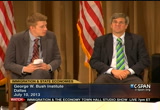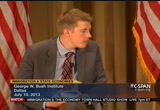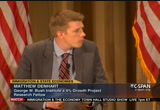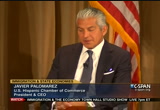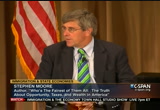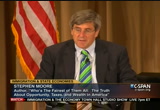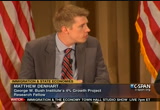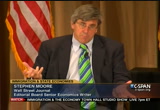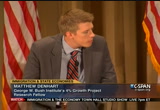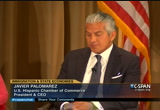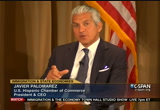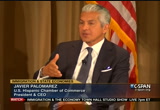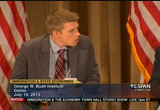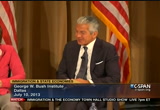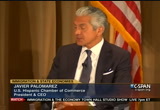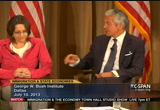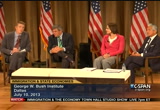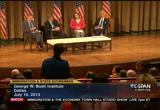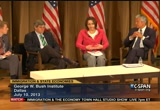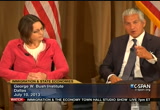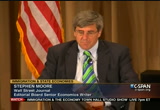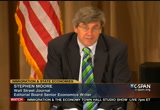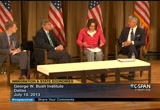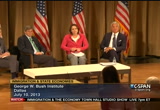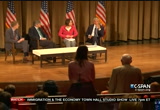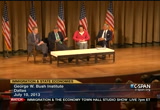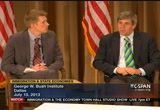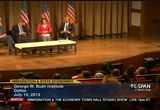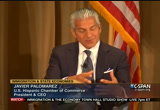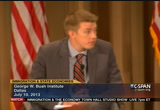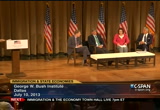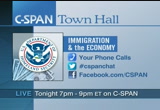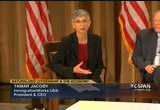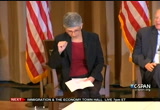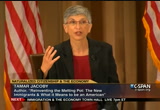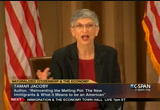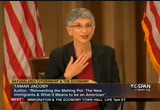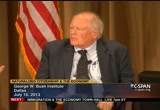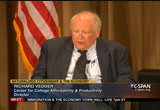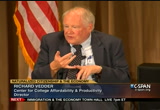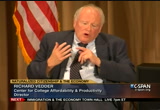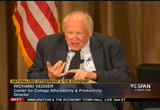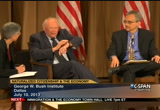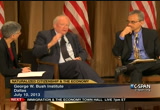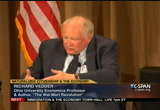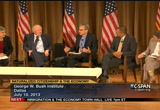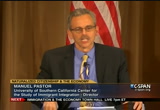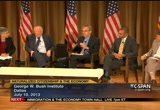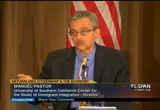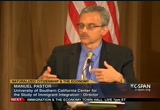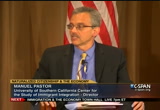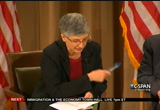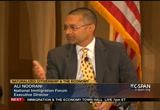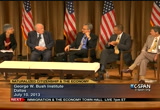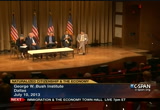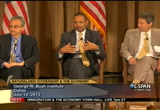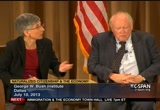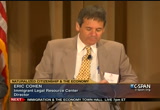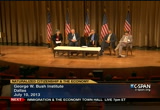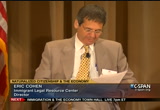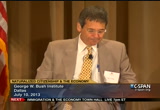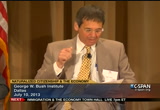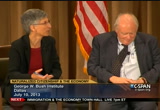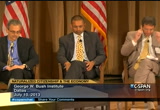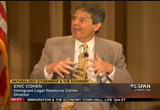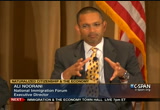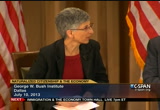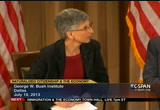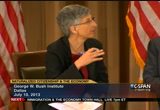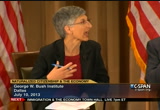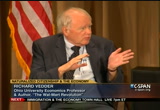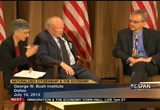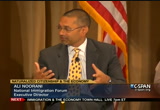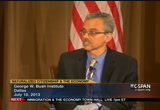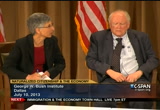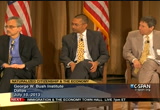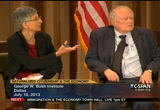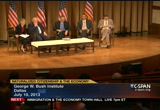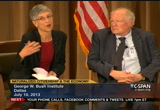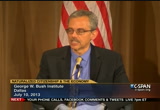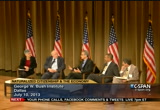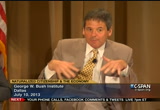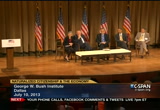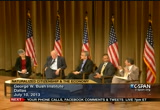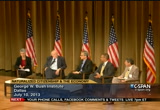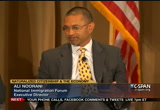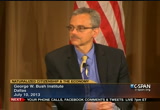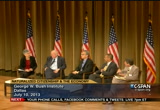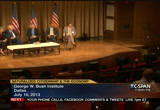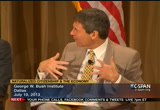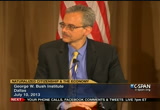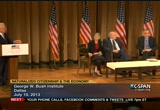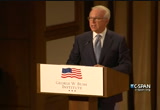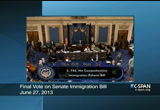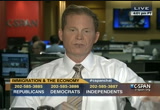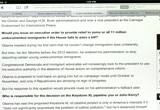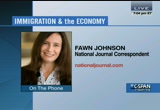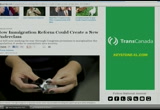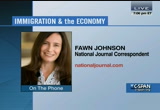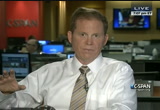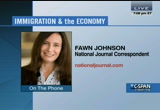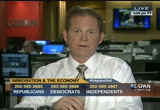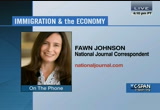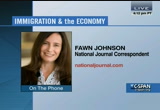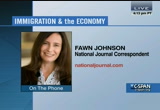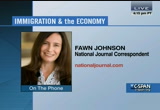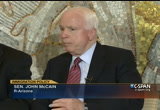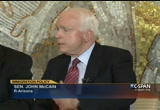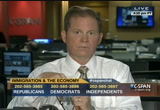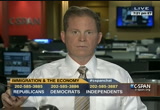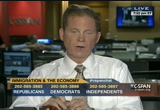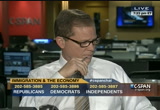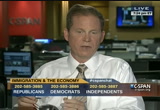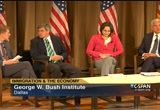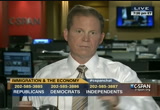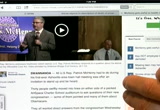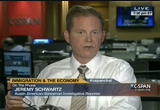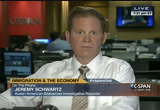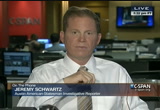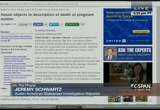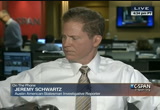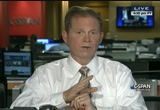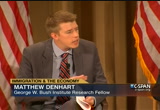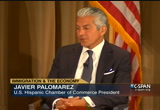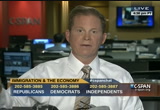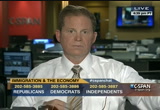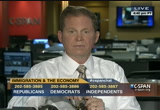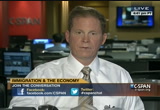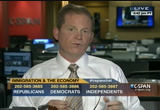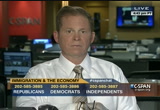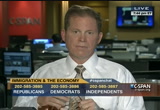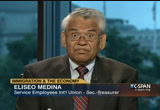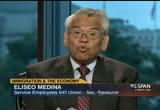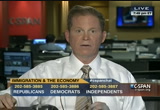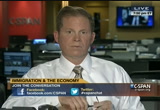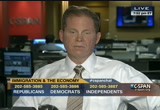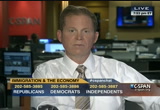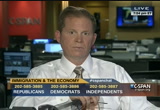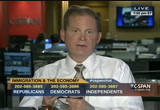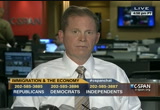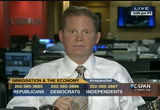tv Public Affairs CSPAN August 8, 2013 5:00pm-8:01pm EDT
5:00 pm
let me give that time toin amern eight. if you look just here in dallas, about one in four. really, i think we could not be in a much better place than america to have this discussion right now. i am joined by a fabulous panel of experts. usy are going to enlighten and him pack the relationship between growth in texas. many have probably seen him on tv. it ordered member of the wall street journal, he writes about immigration, taxes, many things. i am sure you have read his articles. he has been an advocate for years, a scholar, and we are privileged to have you here, steve. thank you for coming. youthing you do well is look state-by-state a lot.
5:01 pm
you talk about growth and you look at the state and evidence. and what are growing role are immigrants playing in the country? >> first of all, when amity called me and asked me to come here to dallas to speak, i leapt amthe opportunity, because i an admirer of george w. bush. thank you for the invitation. thunder a little bit when you talk about four percent growth year it i would add to what you said, that i do not think we can accomplish four percent growth without immigration. it is a precondition to get to that higher growth rate. it may be too low. we are in the fourth leader -- year of non-recovery. there is no reason the economy cannot he recovering much faster than it is geared five, six, or seven percent growth.
5:02 pm
it is interesting, if you look at the time i called the quarter-century of spectacular, unprecedented growth in america, 2005 -- 1980 two 2005 -- to 2005. let in well over 200 americans in that time. badle say immigration is for the economy or it causes high unemployment. the actual evidence shows the opposite, that the biggest boom. of american history was the greatest in immigration. it is circumstantial evidence. a second point is with respect to state. it is so interesting. we do a lot of work at the wall street journal.
5:03 pm
comparing texas to california, it is a good comparison if you are from texas and believe in the free market. , roughly,ou have seen about one million new jobs in the state of texas in the last five years, and rough lee one million lost jobs in california. that is amazing. is we the points we made are really seeing one of the great wealth transfers in american history, geographically, in states like california that do not get it right and states that do get it right, like texas. veryis one reason to be bullish on texas. the interesting thing also is texas and california are not the two highest immigration states. texas does a much better job in my opinion of economically
5:04 pm
assimilating immigrants. california indoctrinated immigrants into the welfare system. jobs. come to texas for people go to california for welfare. you are seeing the differing -- texas is the model we should be emulating. a last point, because it is at the top of my mind. i would urge all of you, if you have not had a chance to read our editorial this morning on immigration -- i was likely -- lucky to get here last night. the united states of america has such an incredible opportunity so much larger than any other most of thebecause people in the world who are talented and educated and ambitious, their first choice to
5:05 pm
where they want to go to to leave the country is to come to the united states. they want to come to the united states. we have an incredible opportunity to exploit the opportunity for the benefit of the american citizens. that is what this whole immigration debate is and should be about. how do we have in immigration policy good for the immigrants, obvious, but also good for merican citizens? i am worried this immigration debate in washington is migrating in the wrong direction. the last point i will make, i hear 100 times a day in washington, "what will we do about immigration problem? " " immigration opportunity and advantage over the rest of the world. that needs to be exploited. i always say when china --
5:06 pm
china is not going to surpass the united states economically because our chinese are smarter than their chinese. this is an and norma's advantage and we have to exploit it. it is really something. thank you. >> a follow-up on one thing. you talk about there are a lot of immigrants and a lot of growth. a lot of people do not realize the growth of immigration in different states has been away from states like california and new york, although they still had some growth. the expert we will hear from later. traditionally, immigrants have gone to the south, other than -- shunned the south, other than texas. .hat has been a problem
5:07 pm
now, you are seeing dixie really attracting a lot of the immigrant states like north carolina. one of the states with the biggest percentage increase of immigration over the last 15 years has been georgia. it has become a high-growth state. people at, are immigrants more attracted to a state with high welfare benefits, or are they attracted to a state that has jobs? ,e look at some of the evidence and what we found was, on balance, immigrants are much more likely to go to states with unemployment rates than withare to go to states welfare. they are coming here because they want a job, not a welfare check. >> it makes logical sense. you are to leave your country -- make out somewhere new >> there are so many people on the other side of the issue who think immigrants come here for
5:08 pm
welfare. some do. some do. but the vast majority do not. they come here because they want economic opportunity and a job erie >> that is an important point. next, we will focus in even more on texas. we have an international expert on immigration issues. she wrote a chapter on the bush institute looking at growth and immigration broadly. she is the author of a fabulous book. she is also at the federal reserve bank of dallas, senior economist studying immigration. where is the you, growth coming from? >> when i talked to the media, i .ry to simplify it i say, there are three main
5:09 pm
components of growth. then there is what steve was talking about. the three main components is really oil and gas. it is huge right now. >> we will have a conference on it in september. >> then i talk about geography, . talk about manufacturing >> hold on one second so we can hear your wisdom. sorry, everybody. >> we thought you were going to tell us whether ben bernanke is going to ease. [laughter] >> you are stealing my material. but that is all right. i have got more stuff. >> manufacturing, international trade, have been huge in texas.
5:10 pm
oil and gas more recently has been a big proponent of growth. not only a high national population growth rate. not just international, but domestic immigration. it is interesting in recent years, in the 1990's, international -- it really took off in texas. it became extremely important. recent years, domestic migration has been more important than international. it shows the growth differential that is broadening. if you look, i will admit the four percent growth rotted sounds like a -- project complicate lofty goal. we are actually averaging over four percent growth. inflation adjusted. the state of texas, yes.
5:11 pm
time.an amazing growths the other point i want to make is there has also been a big transformation at the texas economy. of the 20th century, the oil, the cotton, and the cattle state. it was not until the 1980's and especially the 90's that we into arm ourselves modern industrial-based economy. this transition came to two factors. one was oil. if you remember the late 90's, that decimated our oil and gas industry and forced us to change. luckily for texans, texas is a state that has been able to change. that is because of immigration. >> high skilled immigrants, a
5:12 pm
bit of a sort -- shortage. cap six is unique from other states. are they good for the economy? >> a lot of people will say, they agree. we should bring in every phd scientist we can find to start a new google. do notout those who have a high school degree? what role do they play? good news,l especially now. when we look at our immigrants, .xceed percent are mexico lesson 30% are from mexico nationally. they are less likely to speak english fluently. we see all that in statistics from texas. if you look at these immigrants, they have much higher unemployment rate than low skilled immigrants nationally
5:13 pm
and lower unemployment rates than nationally and they do quite well. they are stable, especially compared to the rest of the nation. they do very well. in average wages turned up the last couple of years. it is just a testament to the success story of the economic miracle of texas and not just in the recovery, but long-term. we have low skill immigration and they contribute tremendously. does thatilled, become better at attracting high skill industries? more high skilled in the last several it goes back to the 1990's, the texas economy has
5:14 pm
been crucial, the immigration is high skilled. basically again, texas as a commodities-based economy, we that has labor, but changed now and we have been able to bring them in. iny have been instrumental research and development and health care and education. education, our teachers and professors are high skilled and him and -- international immigrants. >> i want to give you a little bit of context. the united states hispanic chamber of commerce. you can give us -- we have heard the facts, numbers, and percentages. real people on the
5:15 pm
ground. i am hoping you could tell us about some of the businesses you represent here in texas and what role you are playing in helping them be successful. >> thank you for having me. andk you to the ambassador what the institute is doing. it is a real nervous to the american public. we are thankful to be a part of this. together, they contribute about 465 billion dollars to the american economy. is fastest-growing segment the spanish community. we also have 198 american corporations and we do our work through a network of local chain of commerce and business associations in the united eight. we are proud of the fact we advocate on behalf of those people who are practitioners.
5:16 pm
we write, talk, and advocate on behalf of business owners. ,t is always thrilling to me the practitioners. the ones who create the jobs. i am happy we have some members of our association here. and ie four members cannot see them here but i know they are in the crowd. patricia is with us today. .atricia began a company her company's headquarters, san antonio, texas and she immigrated from mexico. last year, her country did about $138 million of revenue. she employs close to 100 texans. we also have a gentleman with us here today who also immigrated to the united states from mexico. his company is heren dallas. that, if youpany
5:17 pm
have ever crossed the bridge that just came up that everyone is talking about, or if you visited jerry jones's house, -- >> we all wish. he employs over 250 texans. , who is thek grandson of german immigrants who came to this state looking for opportunity. today, frank manages over 3200 acres in texas. finally, we have nina with us from dallas who immigrated to -- united states from exit from ecuador. last year, did about one quarter of $1 billion. people and over 3700
5:18 pm
a thousand of them are texans. these are the practitioners and the american dream incarnate. they are driving the texas economy forward, paying down the tax bill, and what this is do everyday. they if if you would stand up and be acknowledged, that would be wonderful. >> thank you for being here. [applause] >> that is the american dream right there. >> everyone of them could've chosen any state any state in the nation to continue their business. the fact is, they chose texas for all the right reasons. they are living proof of what this state has to offer. ,> when did you choose texas in your estimation? what are the things about texas that make it especially
5:19 pm
friendly for immigrants or other people who come here and want to start a business cap help they can grow to that level and drive the growth we these four. >> individuals, and i am no position to speak for them, but i can surmise in the case of these four individuals, you look at the sectors they are in. technology, travel, construction, and agriculture. you are looking for people who want to work. act rooms --oth's both ends of the spectrum in terms of skills, for highly technical positions. i would not say low skilled. i would say differently skilled work that happens in the agricultural scale. in all of those cases, they recognize this is a state where
5:20 pm
workers are ready, willing, and able, because state makes it possible for them to work and build their own individual work as a family and employee, but help the enterprise continue to grow. >> it seems we hear this everywhere. seems like it is conventional wisdom. i do not think it is. we have to make a protection for american workers. this myth that immigrants come and take jobs. even our leaders in washington on either side, they seem content. they buy into that, that we need to build protections. when the -- how do you respond people who say that immigrants come to jobs? >> we would do at what has transpired in neighboring state.
5:21 pm
you look at what happened in alabama recently. that state has a fairly draconian anti-immigrant piece of legislation. the fact of the matter is, when it is boiled down, you look at the end of the case, they have 40,000 workers who get up and leave the state. the state lost about $10 billion of revenue and about a half $1 billion of taxes, that it could have garnered, had those works -- workers state in the state and worked on the crops and in the construction site. there is a lesson learned. of whatiment is part happened in alabama. i hope that will never be the case in texas. thennk governor bush and president bush illustrated leadership in terms of his understanding of the immigrant
5:22 pm
communities in terms of the work the immigrants come here to do. he welcomed immigrants to the state of texas. a very clear minded understanding of the contributions immigrants make to the state of texas. there are lessons to be learned, when you study what has happened in states that do believe immigrants are there to take their jobs. no one came back to take the jobs with the immigrants left untended. >> i want to come back to you and ask, what are lessons from other states? great growth, a lot of them driven by demographics and immigrants. some other state, four percent wrote, we need some help. ,> one of the other things when you talk about where the growth is in the country, and texas has had the much growth,
5:23 pm
whenever people who disagree with my free market philosophy, they say, people are going to southern states because of the nicer climate from michigan and illinois. it is interesting. i guarantee you, as wonderful as dallas is, i guarantee you people are not moving from san diego to dallas. [laughter] -- and i think this is fascinating. does a betters job of simulating immigrants in a society in a much that are ay than california does? it is something we need to study more. texas has the free enterprise
5:24 pm
mentality that some of the .tates like california do not we talked a lot about hispanic immigrants. i live in washington dc and you are asking where other states are going. we the a big increase in immigrants in coastal states. it is an interesting phenomenon. when you go to the resort towns, i would say 75 to 80% of service workers working at hotels and restaurants and on our eastern europeans. they are czech and polish. a really amazing phenomenon that they have taken over the occupation. be whites and blacks that have the jobs and now they are going to eastern europeans. did a biggton post story.
5:25 pm
they interviewed a lot of these people who, most of them were very new immigrants and most arrived. it was really fascinating, the attitude of the immigrants area several of them told a reporter, the great thing about america is there are all these jobs there that is dumping americans say. another thing a lot of these immigrants said was, the other great thing about america is its you work art, you can get ahead in this country. i was in texas a month or two ago. it was a small business, not just one of those taxis. i asked him about his ,xperience coming to america and he said, when i arrived here, it was like i had woken up. drivea kind of ambitious unique to immigrants.
5:26 pm
99% of the people in the world never move more than 100 miles from where they grew up. we are talking about the one percent of people courageous enough. to leave your homeland is a courageous thing to do. as an economist, this is one of the advantages of having immigration. for come free selected economic success. and, this gets back to my point about china. is whether issue the united states, whether china, will be the world leader. that is the biggest issue on the world stage. that -- i'm only half kidding. the big advantage over china is we are the melting pot. i believe it gives america a huge competitive edge. if you to places like, i was out at microsoft.
5:27 pm
i gave a lecture there. it was like the united nations. people from every country of the world. nowhere else in the world you have that melting pot than you do in the united states of america. >> i want to turn to you and follow up a little bit. why do you think texas is so good at a simulating immigrants into its society? also, what are some of the trends? are they doing it well or better yet health immigrants who come, if they lived here longer, do they gain more? in texas, it is a microcosm of the u.s. in this is the u.s. does a lot of things right about immigration.
5:28 pm
i go back to the horrible protests recently. i look to the u.s. and i always think, what are we doing right? the thing i think we do right is we put people to work. all countries take different perspectives on this. in europe, it has traditionally been a lot of refugees coming into europe. they have been deliberately left out at the labor market, prohibited from working for several years and deliberately on welfare. they were deliberately put there because they were protecting german or swedish workers by being out of the labor force. they got it backwards. the best place to a simulate people is to get them into the labor force.
5:29 pm
looking at the contrast, what have they done in germany? they are not learning german. they are not participating in the labor force. they devised these strong how do we do it in the u.s.? , you care speak whatever language you want here they go to work and learn english on the job. in whiche the society they're in. they are benefiting from it is a tangible light. western europe, they are starting to come around and understand the significance and , it is for the immigrants also. it is the best place for them to appreciate the society which
5:30 pm
they come into. >> you represent businesses country.e you talk about other states that passed law. but is what we are seeing in texas having from other state -- in other states, to? what is promising growth in other states? >> i would like to go back to the point steve was making this is in terms of, the place where immigrants from every point of the globe come from. imagines true -- imagine trying to start yahoo or ebay. the reality is they are here for a reason. if you study the impact of entrepreneurs on our economy historically, some of the most iconic brands in the world were
5:31 pm
created by entrepreneurs who came to america. fortysomething percent of the fortune 500 corporations were started by an immigrant. if you study the phenomenon, at&t, bank oflike america, google, intel, coles, yahoo, they were all started by immigrants. they were all started here in the united states for a reason. toyou bring that back down the state of texas, we are leading the way. texas is the number one state when it comes to exports of other nations. it is important to recognize, principally because of george w. shown by bush, when you look at states like arizona, not to take on arizona, but i was just thinking a's today. arizona, itat
5:32 pm
exports fiftysomething million dollars a year. in texas, $206 billion year. some of those exports go directly to mexico. i think george w. bush understood the tenuous but important relationship that has to exist with our neighbors to the south. he was very strategic and smart in building, growing, and fostering the relationship over time. today, texas is benefiting from his leadership. a large proportion of hispanic owned firms and minority owned firms are from mexican international. this happened because very strategic, visionary leadership decades two or three or a decade ago.
5:33 pm
we are benefiting from it. .t does not happen overnight you are seeing other states beginning to recognize and emulate that. there is no stopping this state now, at the rate it is going, it is good news. i see other states trying to study what is happening here and learn how to harness the opportunity immigrants represent to the state and the nation. >> one question. we will open it up shortly. we want to hear from everybody. situation in mexico, the economy is improving a little bit. mean for texas, a state where 60% of immigrants in texas are from mexico. international changes, what does that have in story? >> less immigration from mexico. we have already started to see that, whether you look at
5:34 pm
authorized or unauthorized immigration. a slowing from esko will continue into the future. are veryher side, we excited about the reforms of mexico. look at the texas economy right now. and oil and gas bone. the economy -- likely talked about earlier, it is going quickly. texans are hoping, looking into mexico saying, they are talking about an energy roof arm, can you imagine? intois how texas extends northern mexico. that would be good for the texas economy. we are hitting records in terms of our exports to national -- natural gas in mexico. we are excited about more good things to come here it >> one of the things that really bothers me, i am involved with
5:35 pm
this immigration debate. some of you may not agree. but united states senate just passed a bill that $30 billion in securing the border, and i do not know if they want to gold the wall of berlin or what. it is such a positive thing. i hate the idea that we will wall off america from central america. the integration of these economies has been such a positive thing. [applause] >> nobody in washington agrees. >> i feel the same way. i just cannot be as irreverent as eve can be about it. i admire so much, the claims spoken. i had an opportunity to speak with president obama.
5:36 pm
of course, we talked about immigration reform, and i wanted to talk about it from an economic perspective. that was fantastic. i said, the reality is, you would not be mr. president were it not for the hispanic vote. the history of this country has the hispanic community played such a role in the election of a president. never again will there be an american president without quoting the hispanic vote. i am for you to please begin to change the narrative that has defined the relationship between latin america and the united states. >> not just with mexico, but we open up our opportunities and
5:37 pm
participate in these markets and everybody benefits. >> every time i hear about it, these are the facts, but every time i hear about it, the narrative has words like illegal immigration and drug wars and order crossings. true. that is we are not turning a deaf year or a blind eye. the reality is mexico is the second-largest trading partner in the united states and will be for decades to come, bigger than in the -- england, brazil, japan, and yet, we never hear from that. it had a governor at the time --"knew the importance" is did that economic business that quoted that economic business partner. positionnot be in the
5:38 pm
to take advantage of the opportunity that exists. , we would do well to recognize the economic importance of the relationship between mexico and the united states. >> thank you all for making that point. now have time for questions from the audience. we would love to hear from you. such a great panel here. if you could raise your hand if you had a question, we have microphones around the room, i ask that you give us your name and if you are here with an organization, let us know. i asked you to please ask those questions. we do not have that much time, but we are happy to take questions. >> while we are waiting, when you asked me about where immigrants are going now, the state over the last two years that had the biggest increase in immigration has been north dakota.
5:39 pm
north dakota is the state -- >> we talked about four percent growth. north dakota is eight percent. >> it is interesting you have got the state, mexican immigration heading to north dakota. it democrats -- demonstrates the point that immigrants go where the work is. >> hi. i am with the dallas women's foundation. with immigration being an important engine for texas's growth in our past, i am our issues with educating our many hispanic youth in the country, as well as through the college age. our inability to provide a strong education, will it be a hindrance in the future? you hit on a very important point that we needed
5:40 pm
to touch on in this conversation. tremendouslynefit from immigration, they are already educated and working age and education is pretty much done. the jobs for us becomes to educate their children, which will become our future. that is an important task, where with growth comes all of these responsibilities, education and healthcare. that is something the legislature has been struggling with in putting together the , when he hadtime so much population growth, every year, 400,000 people, half of those are migrants, with some -- some with large families, i think we have to have a clear understanding that when we attract this many people in grow
5:41 pm
this vast, education, healthcare, even infrastructure. >> i will add a point to that. when you look at the issue of immigration, there is a huge correlation -- intersection between immigration reform, education and business. the united states chamber, we are not a political organization. we do not take sides. we are a business association. it is about read trade, economic growth, job creation. we struggled as to whether we anuld even have a voice opinion as it relates to education. in the hispanic community, there is a challenge getting our youth to the next level in terms of secondary education. if you look at it, education is an economic issue.
5:42 pm
, the sooner we begin to grapple with the notion we have got to have a prepared and educated -- the kids who come after us, we will not be the economy we are. at the end of the day, the greatness of the country rests on the fact that we have a phenomenal economy that the rest of the world comes to an where the majority of innovation happens. very concerning rate, we are running out of trained and prepared individuals to take us to the next growth opportunity. them to a place for take ownership of the education challenge. i am pleased when i see organizations, at&t, and headquartered in dallas, texas. , through their
5:43 pm
investment to help stem the tide of high school dropouts, they have invested $300 million this year to try to help that. it is critically important and will take all of the players in our community, including your organization, at the lead of trying to create the thought process that will get us there, i do not think we will get to the solution we need as a nation business get debt gets involved. texas is leading the way illustrating business leaders who are visionaries see the correlation and are investing dollars in helping to solve the problem. >> with respect to education, especially children, they are real issues for states, especially the ones that have a big surge in immigration, but oneing at the big victor, of the reasons immigrants are
5:44 pm
at a huge economic advantage for the united states is because if you look at the most recent census data, 65% of immigrants come to the united states between 18 and 35. they are right in the sweet on at the start of working life. if an immigrant comes to the country at the age of 20, it is -- the home country spent all its money educating the immigrants and then they come to the united states. view a human being as an investment, the first 15 to 20 years is our cost. then the working years is our investment. we do not have to pay for the education class for the most part of the immigrants. the other country does. the value of that each year to the united states is in the hundreds of aliens of dollars. immigrants have children. thanchildren on balance
5:45 pm
americans do. there are education classes like texas, but immigrants are contributors to the public education system. fine.that is i totally agree. i want to add a couple of things. we just recent data out of a sharp increase in high school education for someone who .s hispanic it is really good news. we are still trying to understand and process this. the increases are large. we are trying to understand how it is happening. it is suggesting they might be way off in terms of projecting still 20% of now, nativeborn hispanics will drop out of high school. it is hopefully changing and we are seeing the beginning of that. the other thing i want is a quickly, we focus a lot on education but we did an interesting that he on poverty
5:46 pm
and the poverty gap. natives anding at immigrants and the fascinating thing we came up with was we focus so much on education but explanatory -- explanatory factor was english. i poke fun at the germans earlier. i will take it back a little bit. we found not being able to speak english explanatory well y explained over half the poverty gap. that was a huge factor. that is really important. we could do more there. i do not think that gives us much attention. >> great. other questions? here in the front. thank you. >> my question is, what would -- have done had you leo of and you couldr
5:47 pm
not supply your family with , clothing, shelter, education, transportation, but you knew the racial economics are the minimum wage, 10 times greater in this country, next door, what would you have done for your family? >> >> -- let's ask the are the minimum wage question to the panel. people are by chance born in one .ountry or another it seems natural they want to follow the opportunity. >> i would have bothered yet again with another request. i would have gone with the let'soring country >> talk a little bit about, some of
5:48 pm
the barriers, we have written that we do not have good ways to come near. that is part of the problem. that is part of the debate. >> that is a good point. ofyou seal the border mexico, then the work opportunities will be open. how will they be filled? beas overstays? from canadaoming or both? ifinteresting to think, it you are not -- if you are not going to fill by immigrants from across the border, what are the unintended consequences of doing what they are planning to do? what is a way we could
5:49 pm
provide a way for people to come here to work? >> this gentleman has a great point. i was in >> texas hunting. i am not a great hunter. we were out in the middle of nowhere in west texas. at night, some of these migrants to our door and one water and basic food. that is an incredibly heroic act that people would take the across theome border and put their life at risk and it is such an important point that we remember. a million people want to leave here, we will know that america is in decline. the fact that people will still risk their lives to come here is something we should admire about our country. wantsigrant family that
5:50 pm
to come here, how do we allow them the legal channel? there is no question illegal immigration is a function of job opportunities here. if the economy is going four percent and we get the unemployment rate down five percent, they will come for the very reason you said there'd we need to make sure there are ways they can come here illegally -- legally. the program has a lot of negative connotations to it. 1960 --gram in the 1950's. >> if you look at illegal immigration, if you want to know the most effective program in the history of this country, it was the program in the early 60's. we reduced illegal immigration .y 90% by having a plan
5:51 pm
that is the obvious solution. the immigration bill before congress does that and that would be more effective than building these surveillance letting people come here in legal ways. >> another question? down here in the front. please wait for the microphone. thank you. >> great panel. we talked a lot about the texas economy and if you compare it to theona or alabama, clinical environment has been so favorable for it. you worried about the harsh
5:52 pm
rhetoric starting to come out from people who are elected about the anti-immigrant that will affect your economy in any way echo -- way? wethe fact of the matter is rhetoric andharsh ill-conceived legislation -- legislation. ,e have seen it in florida arizona. at the end of the day, in our mind, and we look at things from a particular perspective, about commerce and economics, this kind of anti-immigrant sentiment that leads to the anti- immigrant legislation is not only bad for the immigrants. it is bad for business and that makes it at for america. that correlation, it is like 100%.
5:53 pm
passed in these states like alabama and arizona, the economies of both states have gone from bad to worse. there is nothing emotional about this. every state in the nation needs to be clearheaded about what we are attempting to do. it is an emotional subject. on both ends of the spectrum, it is an organization that tries to put the campbell through the eye of the needle. the best thing we can do is continue to remind people there are important economic and commercial implications to this type of legislation. as americans as investors. they agree on immigration a lot more than we hear about and that a lot of us realize. about economic
5:54 pm
contributions. a lot of times, the third or fourth thing someone thinks about when they think about immigration. what are we trying to do with this session and all of our work is bringing faxed to the to americans, so we can have a more informed debate on the topic. >> it is interesting. texas is very different from southern states. in 2010, we had a lot of bills introduced with some of the harsh rhetoric and bills, i said, i do not think anything got past. however, it works. often, to the benefit of the thoseeconomy, to reject kinds of bills. it was a demonstration of just how things are here. i am sure for good reasons. , it is aases, texas
5:55 pm
demonstration of how different we are here. it is interesting and has significant meeting -- meaning for the economy. >> we have time for one last question. if there is one. please wait for the microphone. >> this is partitioned from san antonio. talking about people who come --e illegally >> did you say legally or illegally? >> both. the sentiment. people want to come to work here but they want to go back home because their family is there. a work permit is something that would be very beneficial. they do not want to stay. many of them stay here because if they go back, they can never come back. i am sure you know one worker
5:56 pm
may be supporting three or four families in mexico with the money. they are longing to go back. fratello -- facilitating the workers is an opportunity for other people to come back. they would not stay and become a burden, and i think that is something very provocative that should be experimented on. came here, in i was longing to go back for 10 years until i adopted myself and made myself so happy. this is my home. the working permits would be for one year and it would be very good. >> wonderful. i think we are about out of time. before we go, i want to thank the panel. a key lesson we learned is that people are assets.
5:57 pm
different kinds of assets and especially immigrants are assets. is i wishy regret texasrugman, -- he thinks is a backwater state without indoor plumbing. they see what going -- this is what drives people crazy. thank you for putting us on. >> if everyone could thank the panelists. [applause] [captions copyright national cable satellite corp. 2013] [captioning performed by national captioning institute] >> tonight -- >> campaigning is not allowed. you cannot come out and say, i would like you to vote for me for president. you cannot ask for office directly. you have to use these subtle back channels. women were a good conduit. --ple spread their get
5:58 pm
asked them to spread their gossip and favors. she knows she cannot trust these people. she is not naïve. a lot are spreading false gossip or false information. they are misleading. she is aware of the political game going on. presentation of our original series continues tonight at 9:00 eastern on c- span. >> starting in about an hour, c- span hold a town hall discussion on immigration and the economy. the senate passed an immigration measure in june. house committees have can injured immigration legislation, but nothing has come to the house floor for debate. a reporter will be on hand to take your phone calls. we will also read your tweets and facebook comments. again, the town hall gets underway tonight at 7:00 p.m. eastern
5:59 pm
. hear about the economic effects of nationalization from panelistth. >> thank you so much. i pleasure to be here. i worked with president bush in the white house to advance immigration reform so it is a pleasure to be back in his beautiful new house talking about immigration. thank you to the bush institute. i want to hark back as we get started to the ceremony that we saw this morning. what we are going to talk about is not just how immigration is good for america, but how naturalization and citizenship ups the ante and makes immigrants more beneficial for the united states.
6:00 pm
morningople we saw this when they came in the door, they were advocates for america, but when they went out the door, they are even more of an asset. we will delve deeper into that. what i want to do is frame it a little bit, what we are talking about, and how citizenship fits into the process. we are not talking about the debate in washington. we are not talking about comprehensive immigration reform. we are not talking about illegal immigrants. what we are here to talk about are legal immigrants on visas who decide to make the transition to be citizens. legal. what part of legal, don't you understand? hold on the worthy goal. what i would like to do -- the word legal. before we get started, how people become citizens.
6:01 pm
when you talk about citizenship, what you hear is, why don't they just go to the post office and pick up their papers? as if citizenship is something that happens like that. it is not. -- people, onn be a visa, sometimes they come on a long-term visa. sometimes they come on a short- term visa like a student visa and graduate to a permanent visa or green card. once you have a green card, you wait at least five years on your permanent visa before you can apply to become a citizen. many wait five years, many wait 10 years. some people remain in the country and never become citizens. a legal permanent visa allows you to live and work here but not vote, not serve on a jury, not serve in public office. you get different government benefits.
6:02 pm
what we are going to talk about is why people make that step and what happens when they make that step. what you have to understand is 1/3.it pricks down about if you watched tv, you would think all immigrants are unauthorized. it is about 1/3. 37% of immigrants are citizens. 31% are people with permanent visas. 28% are unauthorized. the picture you see on the news is misleading. the question before us is what about this third that could become citizens and haven't? 8 million people. that is a lot of people. i was looking at the numbers -- it is a long line. 8 million people could become citizens tomorrow but haven't chosen to do it. one question is why and how can
6:03 pm
we encourage them? it would be an incredible economic boom for the country. -- the last point i want to make the front turn it over to our panel is, citizenship is a long process of integrating. takes a whole lifetime for many immigrants. sometimes two generations. it has many phases. it is everything from coming in getting a job to finding an apartment, to eventually learning english and perhaps marrying an american and serving in the military. assimilation means many different things. some of them objective, like getting a job and rising up educationally, some of them subjective. hereng to believe you long -- belong here. citizenship is the capstone of that process.
6:04 pm
it is what people do when they decided a long here and want to join the family. we want to step back from that emotional side of it and talk about the economics. making that decision, what does that mean for you economically and for the country? i have a terrific panel here. them asng to introduce i asked them a first question. let's start with you. you are an economist. you're a professor at ohio university and a fellow at the bush institute. let's talk about the big picture. before we get to citizenship, can you help us understand how integration or assimilation yields economic benefits? what happens economically when people go through that process
6:05 pm
and become integrated? what happens to incomes? what happens to education levels? when people settle and put down roots here? >> excellent question. i am thinking of something james glassman said a minute ago. he said immigrants get it. but immigrants don't get it overnight. it takes time for immigrants to get it. immigrants come to the united states, maybe they earn 60 or 70% of what a nativeborn american earns. there is some argument. we won't get into that. most of them have more or less caught up with nativeborn americans in terms of income. it takes longer to catch up in terms of wealth. by the time their children come along, the second generation
6:06 pm
often out distances nativeborn americans in terms of earnings. this is true historically. it is a process. it is an assimilation process, but assimilation is something even nativeborn americans had. and a k from college or high school and goes to work and x, two yearsmakesxs 2x.r they are making immigrants have a double problem. language skills are critical. that is the most important determinant of increasing income among immigrants. they learn on the job. best way to learn english is to speak it and the best way to do it is to work and have to talk. they learn work discipline. some people come from countries
6:07 pm
where getting to work at 8:00 may mean 8:30. in the united states, it means it :00. -- 8:00. there is a whole host of things, colloquially as and's -- colloquialisms. things that you don't learn in english class. is an assimilation process. it takes quite a number of years. a lot of it is learning labor market information. learning about occupational choices. you come to the country, you are limited. you have friends and relatives who helped you get the first job. you may take the first thing that comes along, but your choices are limited. over time, you build up. one way you build up is through education. immigrants tend to go to school at night to further their education. process ofdentialing
6:08 pm
naturalization is not entirely different from the credential of getting the college diploma in a slightly different context. a college diploma tells an employer, this person is fairly bright. probably speaks english well. probably is going to get to work on time. probably is not a drug addict. probably is fairly productive. we pay a premium for college graduates. similarly, i expect naturalization has a similar impact. a person who can say that i am a naturalized citizen is a person who is saying, i am making a commitment to this country. i want to be a member of the family. employer's minds, this person is a little more committed, disciplined, capable
6:09 pm
of doing what i want. therefore, i am willing to pay a premium. the next people will speak much more. there is a premium, maybe 10%. ofyou have painted a picture up 18ants, they do catch -- between 10 and 20 years. what was it like in the past? you hear a lot of people say, my grandmother spoke english overnight. all you hear in the supermarket is spanish. how are immigrants today assimilating compared to immigrants in the past? >> that is a wonderful question. i love to talk about this and i have to be careful. i am a professor with tenure so i talk forever. the -- it is the same now as it
6:10 pm
was 200 years ago. nationalities change, the accents change, the kind of dress has changed. 1760'sn franklin in the complaint about how pennsylvania ized, that thean germans are taking over and they are not the same as the english, not as good, not as smart and so forth. irish 1850s, we have the immigration. the irish are, first of all alcoholics, second of all caps lick, and all the -- catholic and all these things, and the catholics won't be able to integrate with the protestants. [laughter] integrate quite well on college campuses.
6:11 pm
click the economic benefits. >> the know nothings so you need to be naturalized. is that thent current generation is not as good as the previous one. it has been true throughout history. benefits -- in 1909, the administration said immigrants in the united states make 80% of what nativeborn snake. -- nativeborn's make. agenda thatad an wasn't pro-immigrants. basically, bottom line was by the end of their lives, by the end of their career, they assimilate like crazy. they are productive, they move ahead. they get it, as jim glassman said. >> great setting for where we go
6:12 pm
next which is two men well pastor. -- manuel pastor. you are a professor at the university of southern california. you honed in on a art of this in on the economic benefits of naturalization and citizenship. i'm going to sq into parts, let's first talk about the benefits to the individual immigrant. >> let me start by saying that i want to push back on one thing you said which is that some college degrees do signal that you are a drug addict. [laughter] you want to be careful about that. i thought that it would be graceful because i am from california to start by talking about the state rivalry and making fun of california but apparently that was done already. we are hoping now that your governor is retiring that he
6:13 pm
won't spend the next two years become usd.- usc to agoid a report about a year gain," which is a great title. when you tell young people citizen gain, they are like what does that mean? what we gain in particular in naturalization. the interesting thing was that leg whichcontrol for ability, recency of migration. ask you have to explain it without the word analysis. >> basically, we try to control for everything it should explain a difference between citizen and noncitizen immigrants. a found that citizens made
6:14 pm
percent to 11% more than noncitizens. -- eight percent to 11% bar. when you are a citizen, you have a wider range of jobs that you can move into. when you are i citizen, you made a commitment to the country. that commitment leads you to make more specific investments in your human capital, your education. the credentialing affect that you were talking about. the credentialing affect is that employers see the active citizenship as standing up for a lot of those markers you were talking about, worker discipline , line which ability, etc. a couple of the things about this. steve moore asked wasn't it the case that a certain person
6:15 pm
becomes a citizen? when you look at the studies, looking at the same prison over is still find that it about eight percent to 11% gain. we look at the census data and checked a cross-section. we had information on the years people naturalized. we could simulate with the gains were over time. is not a gain from legalization because we in california have been able to estimate who in that sample is unauthorized, who is authorized, and who is a citizen. very little of the game comes from authorization. more comes from making that final step to citizenship. that is crucial in this current debate. the act of including a roadmap to citizenship is about making sure that we can actually capture the economic gains. , and i know you're
6:16 pm
going to ask me a question and i am filibustering, these gains are not just for these individual workers. >> that is where we are going. and, we have eight percent to 11% for the individual. those people here this morning can go out and ask for an 11% raise. take it now to the bigger society. what is "america? -- what is the gain for america? >> it is again for the rest of us in a couple of ways. realize how many kids are the kids of immigrants. for example, in california, half of our kids have an immigrant parents. the gains that they make translate into the next generation, having more
6:17 pm
resources in the house. we can focus in on the earnings gain, but somebody who is a citizen starts to feel more comfortable about going to school, engaging with teachers, being involved in education. improving the schools, communities, neighborhoods. the gains don't stop with the families. we estimated that it is about $21 billion to $45 billion increase in earnings and spending power over 10 years. if we could take the 8.5 million folks who are not naturalized and naturalize half of them, those are the gains we would get. about $1 billion to $2 billion per year if you can move naturalization rates up. it is money we are leaving on the floor. >> you take half of the 8.5 million that could naturalize,
6:18 pm
you get up to $45 billion, over what amount of time? >> over 10 years. one of the things you need to realize is -- by the way if there are anybody who got naturalize this morning, don't ask for 11% tomorrow. that gain happens over time. five to six years to get the initial boost. it probably peaks at eight to 10 years. what we know is that what we do now is assimilate over time. this is an incredibly important thing. we who have been working with immigrants need to do more to encourage naturalization. we need to be thinking what stands in the way. >> we are coming back to that. you are the executive director of the national immigration forum, leaving the new bethlehem project to help people become citizens.
6:19 pm
uel was going. what are the obstacles? why is this a hard process and what is getting in the way? >> first of all, i want to thank the institute for putting on this event and the invitation. the naturalization process and immigration law is mark obligated than any other set of laws in the government. often times -- mark obligated than any other set of laws in the government. complicated than any other set of laws in the government. for naturalization as a process that can take anywhere from seven to 15 years. that is a big range. within that range comes significant cost, criteria that the individual has to meet whet is her itglish orit is notn
6:20 pm
just go to the post office and pick up your paperwork. the other thing is that -- thinking more specifically about english for example -- there is a survey done in 2002 where nearly 90% of immigrants surveyed said that they want to learning this. they believed that their economic success depended on their english proficiency. the previous panel mentioned that when you look at the data, half of the poverty gap between hispanics and non-hispanic whites is attributed to a lack of which proficiency. the obstacle is accessed. >> what about english -- what do we know about the benefits of learning english? >> i would attribute -- argue for anlot of the growth
6:21 pm
individual's wealth can also be attributed to english proficiency. -- you have additional skills to present to an employer. when you talk to employers, whether they are big or small, across the skull range they are looking for individuals with english skills. they are starving for ways to improve the english skills of their workforce. whether it is bringing in a tuition reimbursement program -- there is an incredible amount of innovative models to facilitate english learning. >> let's talk about what you do, what the bethlehem project does. how are you helping people become citizens? steel was, bethlehem the first company to provide english classes to their workforce. we all think, those are the good old days. , one of the leading
6:22 pm
institutions in america said we need to help them learning wish. -- learn english. we have been asking employers like marriott, the intercontinental hotel, american apparel, are you a modern-day bethlehem steel? do you want to help your workforce learn english and become citizens? we are finding in cities across america that employers are saying yes. being ablehe idea of to stand up and tell america that these are immigrant workers contributing to their bottom line, learning english and becoming americans. an innovative model of connecting the employer to their employee in a different way. >> it is not just that they want to sound like a good guy. it is more profitable. we'll come back. if you speaking wish, you speak
6:23 pm
-- speak english, you move up on the job and the business retains you. >> when we first started to think about this in 2004, the boston redevelopment authority looked at the growth in the hospitality and healthcare industries and found that the growth in occupations was going to come in areas that required a higher level of english skills. you saw the workforce have low- level english skills. ,ntil that balance was reached the region was in a huge amount of trouble. >> eric, you are the executive director of the immigrant legal resource center. you are leading the new american campaign. to streamline access to naturalization services.
6:24 pm
i want to ask you what you do in a minute. before we get to that, you have been working for more than a decade helping people become citizens. help us get to the reality of this. we have been talking numbers, historical trends, what are the ?eople who you have encountered can you tell us a couple of stories? >> sure. i also want to thank the institute. i tell people i am a naturalization evangelist. i am like a kid in a candy store today. this is wonderful. i have a very fond impression of the institute and of dallas because of this. i want to introduce you to two people actually three. i want to introduce you to abe sandoval who is typical of someone naturalizing.
6:25 pm
wife are in the process of naturalizing. they came to a workshop that the campaign runs a couple of weeks ago. i was at that workshop with him. there are 200 people interested in applying for naturalization. there were over 100 volunteers. really wonderful. abel's wife is from mexico. abel is from guatemala. he works at the university of san francisco. that is one of the premier hospitals medical schools in the world. they have three children. to earn college. -- two are in college. one plans on being a lawyer, the other is studying business and advertising. in 1988 whentemala he was in his late teens. he came to the united states and became a house painter.
6:26 pm
he came unauthorized. since 1998, he has owned his own business. he has eight employees and does both residential and commercial painting. he has contractors license, fully bonded and insured and has workers compensation for his employees. he does everything by the book. additionally, he and his wife are homeowners. in san francisco, that is a pretty big leap. it is expensive to buy a home in san francisco. he told me why he wanted to become a citizen. he said first of all, i want to vote. second, i want to take the last step of becoming fully integrated because i don't plan on moving back to guatemala. i want to plant by stakes in the ground here. -- after i him helped him with his application, i told him you would be a great
6:27 pm
person to go to this thing at the bush institute. can i interview you are smart -- can interview you? he said, sure. he said "the united states is a great country where we have lots of opportunities and you are allowed to express your opinions. i want to become a united states citizen and live here the rest of my life." he is a good example. he hasn't reaped the benefits of becoming -- cynthia alvarado's and bernardo merino came to the unit states at young ages. he obtained his green card through the amnesty program and family ties. they both naturalized in their 30s which was about 10 years ago. they went to college at the university of california, san diego. they went to graduate school at
6:28 pm
stanford. they are homeowners in san francisco, once again a big lift. they own several investment properties in san diego where they are leasing out their investment properties. they have newborn twins and are helping to support the diaper industry. bernardo is a lawyer and small business owner with offices in france and -- san francisco and san jose. cynthia is a finance expert. she works with the director of property management and san jose. they develop affordable housing and she oversees a staff of over 50 and an annual budget of over $10 million. since she arrived, she has helped raise over $100 million for building low-income housing. that to me was quite impressive. she oversees the management of 1100 units in 700 cities.
6:29 pm
she is also on our board of directors. she is on our finance committee and helps us on the up and up. we are an $8 million and urbanization with lots of employees. they both feel being u.s. citizens helped provide them financial security. they wouldn't have bought a house had been up in u.s. citizens. they would not have purchased investment properties. they didn't want to miss out on the financial opportunities. they, once again, wanted to but their stakes in the ground permanently. >> that is very important. that sense of, if you're going to stay, then you're going to invest in a whole different way. i want to come back to what you do, but i want to broaden the conversation first. we are talking about a very good story, but also a troubling
6:30 pm
story. -- benefits and the uplift when you look at the numbers, the numbers are sobering. 8.5 million people who could be doing this but aren't. the game that you are talking about -- about half of -- what could be done to encourage this? when we start with you and come this way. peopleryone talk about that are not doing it. how do we get them on the train? >> the new american campaign? excitinga very national program going on called the new american campaign. our goal is to help as many
6:31 pm
people naturalized as possible respecting the fact that it is a legal process. we want to do it effectively as well as efficiently. our guiding principles are to communities.act right now there are 18 collaboration's. areollaboration, what we doing here in dallas is a perfect example. here are theities leads. what we got done is help them with financing. the carnegiepport, corporation. to provide financing to help them help as many people go through the legal process -- >> through the legal process? there is a lot involved here. you are helping with the peace
6:32 pm
that is the actual filling out the paperwork. >> exactly. helping them get over that hurdle. they partner with lots of adult schools, english language learning schools, civics learning schools, even banks and lending circles to get the fee. they partner with lots of organizations. >> let's come down the line. you guys are working with business. what are they helping people do? >> i will use the example in washington dc. we work with marriott. our first session was with the housekeeping staff. we met two women who have been working at the marriott for 10- 15 years. they have been eligible for naturalization and the one reason they have not taken that final step is because they had a
6:33 pm
one-hour commute on the train every day. they lived in suburban virginia. they were working eight hours a day, taking two hours to get back and forth home and they have things to do home. they were so happy to be able to come to work and for the marriott to be able to say, we are going to extend your lunch hour so you can get the assistance you need to complete the paperwork. that is one piece. another thing that needs to be done is to look at the process. what investment can be made in terms of facilitating the process so that people are not waiting this long? so that backlogs are produced. so that people can actually go from green card status to naturalization in a reasonable amount of time. >> the problem is a backlog? >> there is an incredible amount of regulation. if you think business is overregulated, look at the naturalization process.
6:34 pm
manuel, you focus on the fee, talk little about that. you have a great number in your report about what happened when the fee went up recently. toin 2007, the fee went up about $680 because they have to pay a fee and do a biometric exam. aboutt year, we went from 1.5 million applications to 500,000 the next year. when you take a look at it, what happened was it really hit less educated folks. probably doesn't feel like that much money. it is about two and a half weeks of take-home pay for an average immigrant worker. to do this right, you want to consult a lawyer, get the right number of english classes, so the costs are even bigger than you think. my best guess is that some of
6:35 pm
you going through this should have about $3000 because they want to check in with a lawyer as well as pay the fees. that is a lot of money. family, --ave a >> for low income folks, it means they are facing a liquidity constraint. even though there are economic gains. one thing to clarify is the english language effect is different than the citizenship affect. 15%language effect is about boost in wages. the citizenship is about an 11% boost. >> let me play that out. 15% is getting to english proficiency. youre not counting that in 8-11% citizenship. >> one of the things is it is good to see how business is
6:36 pm
reaching out. it is good to see the kind of programs being talked about before. all sectors can be involved. in los angeles, the public citizenshipcreated parlors. this is where immigrants and their kids go. they take their kids to the library, there is a corner that tells them how they can become a citizen. another interesting program is the micro-loan program that citycorps and case de maryland have organized. if somebody can give them the money up front, it is good investment. >> we are not talking about lowering the fees. the fees go to something. we are talking about how to help people pay them. >> that is one thing. citizenship and immigration services is supposed to be self financing.
6:37 pm
maybe shouldn't -- maybe we should be subsidizing. we might want to consider changing the fees, like re- upping for a green card should perhaps be more expensive. >> a green card is a permanent visa that lasts for your whole life but you have to renew it every 10 years. >> those things are basically sold out. you could raise the fees there, lower the fees for naturalization, and encourage something that we all say we think is important. >> richard, you want to weigh in on this? >> listening to this conversation, if you weigh the costs and benefits of naturalization to the potential naturalized citizen, very often the benefits outweigh the cost. time ofk, the naturalization, you have 25 more years of work, you're talking
6:38 pm
maybe $3000 or $4000 more a year in income. we have to do or economics of here. -- economic stuff here. >> another band word. itthe cost is -- let's make $10,000. the costs are still relatively small in terms of the benefits. we should try to find ways to overcome those costs. i agree with him that maybe we ought to auction off -- >> that is a long conversation. >> there are ways to finance the 680 -- 680 times one million is what? $680 million per year. >> because of the gain we are going to get, the gain of potentially $21 billion, it could be cheaper. let's go back to the businesses.
6:39 pm
i work closely with businesses. i understand how they see a bottom-line benefit in english. i am not sure i get how they see a bottom-line benefit in citizenship. we talk about the benefits of the individual, the economy, but if i am running my flower stand or chain restaurant, what is the benefit to me of having citizens working for me? >> great question, and when we were starting the project, we had to talk people through it. was,irst question we got what if my workers are not citizens? hr people started to get anxious. is theuestion is, what citizenship process? people realize that through that process people are learning additional skills. that bottom-line impact gets back to the skills that are built over the course of naturalization. businessdown to, every
6:40 pm
-- yet there is a bottom-line impact, but they want to be part of a good story. they want to tell a good story to their workforce and to their customer base. >> i like that good story but i am also looking for the bottom line. >> there is also no cost to the business. the model that has been created is that they are able to create time within the workday. is to be able to engage their workforce in a different way. the workforce fields more investments. >> that is an economic benefit. quick you were talking employee loyalty and a lot of firms that hire immigrant workers, they think this might be an easily exploited labor force. afterwards, they go these are really hard-working folks. one way to retain people.
6:41 pm
the loyalty of seeing your company aid you and the benefits that that has for your kids, that is something that leads to long-term relationships. >> what we find in miami is that hotels are competing with each other. they say, i got the best. my workers are really happy. it is nice to see businesses saying, hey, sign me up. >> let's do another hard question and then we will go to the audience. the skeptics -- you do these focus groups, people say they want to become citizens. even legal immigrants don't get much welfare. what is the answer? what do we say to that? an exaggeration that immigrants crave welfare benefits. there are different periods in
6:42 pm
history -- you get different results. it is true that for some immigrant groups, the incidence of welfare usage was higher than it is among natives. but generally speaking, immigrants are low welfare users. immigrants areal avoiding it like the plague. in many cases, for legal reasons. the ones that are here legally have an extremely high rate of work participation. they work. they are hard workers. they prefer work to welfare. citizen,ou become a you are eligible for other benefits. i have never seen an immigrant that says that's why they are naturalizing, but there are skeptics. >> one of the things that would ,eed into that skepticism is
6:43 pm
there were a lot of folks who shifted over to citizenship from the legal -- lawful permanent resident status in order to access benefits that they were losing under welfare reform. i don't think any serious economist believes that welfare is a magnet for immigrants. when you look at the data, they do not use welfare extensively. the second thing is the rate of mobility. one of the things we saw in california is, emigrants who had been my -- been here longer than 30 years at a longer rate of ownership. people want to sync their roots in. they want to be independent. >> even to the degree there is welfare, you stack it up next to not 25 alien dollars, it is -- $25 billion, it is not much money. >> i used to work with somebody
6:44 pm
who owned a small manufacturing plant making wedding dresses. he employed about 50 people in the garment district. he wanted everyone to get legal and then to naturalized because he felt it was a higher retention. higher retention opportunity for him. to stay with him as employees. he thought it was magnificent that they went through the process. >> great. this is really terrific. let's open it up to the others in the room. we would love to hear your questions. as with the last panel, we would like to hear who you are, your affiliation, and please make it a question if you can. sorry, your microphone as a long way to come. >> i thought we weren't getting any more tough questions. [laughter]
6:45 pm
>> damion with the knight foundation. we have a new app out. my question is, you talk about the economic benefits. can you talk about the benefits to civil society and the fabric of the country? >> just to put that in perspective, we can. our job was to talk economics. i was going to do a disclaimer does i think it is important. we don't want to think about people as widgets. it is painful to limit it to this. to be the kind of person that only think about the bottom line, but you don't want to be the kind of person that doesn't think about the bottom line. let's have a word or two about this. the next panel will be all about the noneconomic benefits. >> in terms of why people become they want the full rights and opportunities and
6:46 pm
protections of citizenship. when president said today, the most important title he has ever had is u.s. citizen, that means something to people. it means something to their neighbors. intangible, but it is also incredibly important when people are dealing with -- state, local, federal or governments, to say yes, i am a u.s. citizen. that is who we are in society. i believe that that is the reason people become citizens. >> go ahead. >> despite fee increases, one thing that you see in the data is when immigrant communities feel like anti-immigrant rhetoric has gotten heated or the tone is negative, they move toward naturalization. they move toward engagement. a main benefit of naturalization as you learn about u.s. civics.
6:47 pm
englishmen to more effective at school. you get more confidence that you need -- english makes you more effective at school. you get more confidence that you need. we have focused in on economics because that is what we were talking about. these are people looking to get a full handle on being part of the american experience >> asking people why they are doing it, people do it when they finally feel i belong. to then't do it to get other side of the fence, they do it when they feel they have gotten to the other side. they want to codify it. >> we should be creating opportunities for those who are not yet citizens to find voice. to encourage them to participate in all sorts of debates. >> eric, you're going to add. >> i have seen that in action.
6:48 pm
they become more engaged in their kids'education. internet road watch programs, etc. , the app.thing the new american campaign is doing a lot of work in emigrating -- integrating technology into the process. >> what does the new app do? out ifan help you figure you plug in your zip code, where the closest location is that can help you go through the naturalization process. it can help you learn the civics questions. requirements, etc. then, if you get to a real computer you can actually go through and get screened for naturalization and complete your application online with pop-ups like a turbotax type of thing. wonderful process. >> another question?
6:49 pm
>> we don't have another question? >> please, tim. you do need a microphone. waiting, a are follow-up on what was said earlier. the economic benefits of immigration have spillover effects that go beyond what we call traditional economic. for example, the additional income associated with naturalization raises tax money. >> very important. tim? >> tim from the bush institute. you talk a little bit about what the process is like. i didn't hear any comment from the panel about whether that is a good process or not. in an economic sense or in a general immigration sense. how would you improve it? >> i was involved a couple years
6:50 pm
ago with redesigning the test. it was during the bush years. relevant,make it more still deep. i challenged anyone in the room to pass the naturalization test. we all think we went through high school civics and history. it is harder than you think. it is a real test. you have to study. the idea of the redesign was not to make it easier but to make it more relevant and study of all. i thought it improved it. >> two things. now this process is much more streamlined than it used to be. if we were in this conversation , and it started with clinton but accelerated with bush, streamlining the process. now you can go from a green card
6:51 pm
in sometimesitizen as little as four months. talking too, we were and a half to three years. that is one positive part of it. i do think the process is elongated. toe years is a long time have to be here to put written. i would be a bigger fan of three years. it would help economically. >> just to be clear, five years you wait before you start? at five years, you apply. then, the processing can get done in about six months. but people -- the process involves this legal hurdle that we have been talking about. in new york, you see people on the subway studying for the test. people are learning history. that thed agree
6:52 pm
naturalization process has gotten better over the past few years. that is a short window of time. ist i am more worried about what takes place before you get to green card status. you enter the country on a family visa on anyone of a ga zillion different work visas. is good, in some ways it is not. to adjust from that worker or family visa to be eligible for legal residence is a difficult process. you have to dig your out it was going to sponsor you, how you are going to be sponsored. that can be streamlined to meet our interests as a country. window, thethat final economic benefit is much greater. >> the requirement that the
6:53 pm
speaking was to become a citizen is a great thing. which means we should be flooding the zone with english- language classes. immigrants are so highly involved in the workforce that they need more community-based evening classes. when you look at adult education classes, you're seeing two times the number of people trying to get in the class. people want to learning wish. we need to make that more available. it is a good investment in the economy and citizenship. >> that was a great study. a couple of years ago, there was a study of how long people are waiting. i forget the numbers. in cities with high immigrant concentrations is between four months and two years that people wait for an english class. people in the focus group are saying, why don't they learning wish? in fact, they can't find a class. also, the million-dollar there a .5 why isn't
6:54 pm
million people eligible to apply applyingllion people annually? 7.5 million, how can we get them to that same state? it is too hard to apply. there is a fear of applying. it is too expensive. all those things are factors that work against our economy. >> which factors are the biggest the terrence? ts?biggest deterren fearglish-language and the of english. you don't have to be a college professor to pass the exam. the fear of how much english you need to know -- it is really working english. a lot of people can do it and they don't think they can. is -- some people just
6:55 pm
aren't ready to take that step. it is really english and -- as manuel said if we flooded the system with english classes, that would be a huge impediment to get over. >> you had a question? >> people also self rate their own english abilities lower. for a lot of people, it is a question of confidence. thisr elderly immigrants, requirement is a huge barrier. they don't feel like they can learning wish at their age. i just wanted to make two brief points. oh right, i have to ask a question. [laughter] i have one question and one correction. when we look at welfare use, we typically look at the household. foreign-born headed households
6:56 pm
actually have higher welfare usage. the reason is that they tend to be poorer and they tend to lack health insurance. their children get state health insurance benefits. the other point -- let me ask you. from talking to people, i have heard that people naturalized in order to use family benefits that they get so they can sponsor families for immigration. can you comment on that? >> that is certainly a big reason why people take steps to becoming naturalized. i have found that back in the late 80's and early 90's that was the major reason. as a u.s. citizen, you can petition for your relatives more quickly than you can as a lawful permanent resident. in my state of california, more
6:57 pm
and more people have been accelerating naturalization. >> i am a journalist and the last question is going to be a lightning round. you get one or two sentences each. i want you to back up away from benefits and think about benefits to the u.s. what is your sum up, bottom line , why is naturalization a benefit? >> me first? because it promotes democracy. it promotes our way of democracy, includes more people that is what we want. >> i think of a small town in texas or the midwest, and those small towns need more immigrants and more citizens. that is the vitality. >> richard, then man well. >> higher incomes. everyone is better off. naturalization adds to that process.
6:58 pm
>> i was at that naturalization ceremony this morning and what i realized was that it made us aware that this is a unique country in which you can become american by understanding what the principles of the country are. that says so much about will -- about who we are. encouraging naturalization goes beyond economic and other reasons. >> i do so much. terrific panel. >> stay there, don't they. we are going to take a break. i just want to say that when i first heard this panel proposed, i thought that is a strange subject. i didn't think that there was any difference between somebody who came here, got a green card and work in america and help the economy, and somebody let naturalized other than the
6:59 pm
citizenship -- importance of promoting democracy. this is an important issue. when you realize how much it helps the economy, it raises important loc questions about whether -- how is he questions -- policy questions. it brings to the surface a lot of issues that people aren't thinking about. in the current debate, there is dissension over the question of whether it is a path to citizenship that we want to change for unauthorized immigrants, or a path to legalization, being able to work in america. this panel is quite convincing on that point. it helped america to help people get naturalized. we are going to take a 10 minute break and come back to talk to our last panel about how americans -- immigrants serve america. thank you panelists. [applause]
7:00 pm
[captioning performed by national captioning institute] [captions copyright national cable satellite corp. 2013] >> before the chair announces a vote, expressions of approval or disapproval are not permitted in the senate. the the bill, as amended, is passed. the clerk will roll the call -- call role. >> restore order in the gallery.
7:01 pm
but the very end of the vote back on june 27 of this year in the u.s. senate chamber, the senate immigration bill, passing there by a vote of 68-30 two, arguably one of the most significant is a legislation that passed the senate, this term. welcome to c-span town hall this evening. , c-span radio, throughout the next five weeks, tuesday, wednesday, thursday evenings. we are taking times looking at major policy issues, politics, and issues of the day. we will spend a couple of hours tonight looking at immigration and, in particular, immigration and the economy. your thoughts on what immigration means to the economy, what economic policies, what immigration policies would be best for the u.s. economy. a couple of ways you can dissipate, as always, on the phone. if you are a republican, the number is --
7:02 pm
we are also on twitter and facebook. we posted the question earlier economic policies, immigration policies, best for the country. we want to talk about some of those before us became at your will. here is a post from francis's says, the bill is welfare for replace contractors to their middle east more money for securities, another way for the gop to fund corporate greed. rick said -- mark writes -- i want to also let you know ther on we will change
7:03 pm
topic later on to ask you about some of the things you would ask the president. is posting six vacation -- free vacation questions or president obama, and one deal with -- deals with immigration. we will have tomorrow's news conference live here on c-span and c-span radio. "would you issue a -- an executive order to provide relief to undocumented immigrants of the house is passed the bill. obama insisted during his first term they could not change the laws unilaterally but he did. joining us to talk a bit about
7:04 pm
that and further action ahead on the house is ron johnson. foreign the us to have -- phone johnson. what are you hearing about the potential plan b echo -- plan b? qwest started to talk about it more openly. theye past year or so, have been really on congress and trying to get something passed in congress. that is everyone's first choice. it is slowing down the possibility the house will not pass on the go. asple who president obama, kerry and john put in their story, it expand his current program he has to deter
7:05 pm
.eportation their hope is that will happen. they do not need to go through all of it for some -- to vote to pass in congress. removedent population deportation and allowed them to get work permits. they hope to get a better deal later down the road. >> also with a new article online, how the immigration reform could create a new underclass, an extensive article on this. what is your point on this article? what are you trying to say? class this is something i've spent a lot of time thinking about. many in that community is undocumented. the question
7:06 pm
explored in the article is, the senate immigration bill has, that people would get a legal status, they would be in a legal 10 years at least before they get a green card. another three years before they can actualize citizenship. there is any number of things that could happen to cause them to fall out of status. one of the biggest ones people are worried about, if a person who is sponsoring an entire family for this legal limbo status they have in the senate bill, if that person is out of work for 60 days or longer, they are not qualified. , their entire family, as they are dependent on this one person, could fall out of status. there is no real way of getting them back onto it. think about it in terms of a family, with children, a child could come
7:07 pm
out to this provisional immigrant status. person would not have a green card until they were 16. during that time, they have test to know federal benefits at all. no food stamps. nooks subsidies under the health care law. they are essentially on their own. looking att you are is essentially an underclass with a lot your chances of read tension than regular citizens. also, safety net. it is a tough question whether or not you want that sanction. >> we are talking about the economic impact of immigration reform. you get to a point where you quote ted kennedy, who pointed out better to get half of what you want. do you think there are enough members in congress who want to
7:08 pm
get that half a loaf and are willing to settle for the rather than falling short of the house and senate on an immigration bill? qwest that is an excellent question. probably a majority of members who would like to see something get past. they would be in the vein of ted kennedy. it is better than nothing. i do not think a majority of republicans want to see that happen. that is an issue because it is led i republicans. in mindportant to keep there are a lot of people who are very turned about how much they will have to see in terms of harshness in order to legalize them. there may be a majority. it would fall into a minority relatively quickly if the deal swung too far being punitive.
7:09 pm
.t is a tough question this is something anybody in congress has to do with all the time. the idea is, if you are a good legislator, you want to pass legislation that does good. the reality is, when you are writing legislation, there is no way to predict all of the consequences that would come through. especially when it comes to something like immigration, which is a lot of what they are talking about right now in the senate bill and the house. it is something that is a compromise. it is not what anyone would want if they had a choice. >> as we focus on immigration and the economy, i wonder if you could hang on or a few minutes and hear some of our calls from across the country. let's hear him rené on our independence wind. thank you for waiting. >> this is so ridiculous to me. these people are here illegally. i live in a city where we are
7:10 pm
bombarded. these people are getting free welfare. we have to pay for their kids to go to school. our kids come home from college and they cannot even get jobs because most of the people are working in mcdonald's in different places. they hire their family members. i do not understand why there is a question. what are americans supposed to >>as far as getting jobs? thanks. any thoughts? the caller brings up a very important point. there are some misunderstandings. no disrespect. it is very difficult for a company like mcdonald's >> thanks. to hire an illegal immigrant unless they have fake ids. they have to bring -- to be pretty sophisticated fake ied's. -- fake id's. -- they have broken the law
7:11 pm
and are taking jobs away from people who are legitimate american citizens. fromroblem is, at least people who want to actually change it, is that those illegal immigrants are not going away. it is harder to leave the country than it is to get in. some things, they are trying to figure out something to do with them. the color made an important way. you want to make sure everybody has access to jobs. perception is that those jobsare taking and it will be hard to pass something in congress eric >> you write about the underclass, those federal benefits, in particular, the debates over the health care law, which shut out illegal immigrants. am i right? complexes is a very interesting debate. there is a little misunderstanding from the caller.
7:12 pm
if -- immigrants are not allowed to have the kinds of benefits americans have. they cannot get welfare and medicaid. then, under the health care law president obama signed, they in thehave subsidies state and national exchanges. it is true all immigrants, illegal and legal, can go to school. have things like school lunches. just to clarify how that works. what is more interesting is --ause of the unwillingness there is a policy idea in washington that immigrants should not have safety net benefit, that that is something reserved for citizens, you have a situation, if you were to legalize 8 million undocumented where they are now
7:13 pm
shut out of obama's health care law, and they also are shut out from the mandate that says you have to have insurance, because it does not make sense to shut them out -- you have an odd situation where you have people who drafted the health care law, all of a sudden, there are people directly opposed to the gold. the problem is people are trying to sell the immigration problem are not trying to solve the other problem. for aks out that legalization program like this to become law, how many people would become -- would qualify, 8 million. around those people, if they do not have insurance already, probably will remain uninsured. because they are mostly young and tend to be healthier than the it is whatulation,
7:14 pm
you want in an insurance pool. it will not happen because of this kenneth we have in immigration policy that they do not get benefit. intenet that we have immigration policy that they do not get benefits. and howpetition laws you deal with the population of people who are here but not in any legal status. 8 million. johnson reports for "washington journal here: caller. >> 11.5 million immigrants here in america. to find outeed exactly how many of them do want to stay here. i live in a rural environment.
7:15 pm
i spoke with two elderly mexican ladies. enough as they make money, they are going back to mexico. i find a problem with this 11 million people. they do not want to become american citizens. >> is it a requirement to learn nglish yet so -- english? >> if you want to get a green card. it is not clear how the people would learn english, but that is a requirement, as well as staying employed. yes. >> fawn johnson, thank you for joining us. you can follow her reporting. we appreciate you being on the program. >> a pleasure. >> more of your calls coming up, looking at the issue of the economy and immigration. recent comments from senator
7:16 pm
john mccain, a supporter of the immigration bill. august is a very important month. the members of congress will pass in the senate. in this case, because the focus is now on the house of representatives, they are back and you -- tory the chamber. ashink it is very important is our constitutional right, to potential -- petition members of congress, elected representatives, that is in the constitution, should be seeking meetings with and communications with our members of congress. i have traveled throughout the state, meeting with various
7:17 pm
interest groups, ranging from evangelicals, to various an ,rganization are all meetings -- throughout town hall meetings, about the importance of acting on this legislation. i think this fall is very important. in ane we get into 2014 election cycle. to issue has really ripened the point enough americans are aware of it that we will act or not act. polls indicate well over seven percent -- 70% of the american people support a path to citizenship provided that -- i will give you straight talk. the payback taxes
7:18 pm
-- learn english, and get in line behind those who came to the country legally. that is an important aspect of gaining the support of the vast majority of american people. vasteason why the majority of american people support it is because they realize, and they have grown more to realize, since ted kennedy and i have fought this battle and lost, that this is an issue of 11 million people living in the shadows, depriving the rights of our citizens, who cannot live normal lives. they are not going back to where they came from. amnesty.facto those who claimed it is amnesty, the bill we are trying to get done, it is already because they are not leaving. people live in the united states of america without the protections of citizenship,
7:19 pm
then some of them, and maybe and of them, are exploited mistreated in a broad variety of ways. that is not what america is supposed to be all about. >> john mccain's a couple weeks .go on immigration senator mccain has just returned from egypt, meeting with egyptian leaders there. he and senator lindsey graham. he also commented on the situation in russia, the decision to cancel the unilateral meeting -- the bilateral meeting with vladimir putin and president obama. in the blog, mccain rushes and to 1955.ations back the recent actions toward the u.s. have reset relations with america back to the cold war era. russians have reset back to 1955, he said in an appearance on cnn this evening. theking a quick teat on
7:20 pm
topic of immigration and the -- omy, \ next, to calls. frank, thank you for waiting. >> yes. we came illegally from 1959. pride or to leaving, we were checked for our financial ability, that our health was clear of contagious diseases, and we were expected to provide a sponsor that would guarantee a burden on the states -- however, a substantial amount of money in bangladesh before that. the money i earned was deposited -- deposited in set for cisco. as a union carpenter, i was working the first day went to look for a job. transferred to an american -- [indiscernible]
7:21 pm
, welfare, vacation holidays, and a pension, which i am now drawing. every benefit american citizens had except the right to vote and the right to be president. after five years, i became a citizen of the united states. >> tell us about, what year was this? >> 1959. >> who acted as your sponsor? >> we found out the money was deposited in a bank account of hours in san francisco. the american insurance and -- insurance company did the same thing. ,t was not necessary because as a carpenter, i had a job which made enough to live on. many businesses and construction throughout the united states. i never had to look over my shoulder.
7:22 pm
we were free, as any american, to form several dentists -- businesses and live an american life without being cheated out of wages and working without healthcare. >> on the job, before you became a citizen, did you ever resentment back or from people who may not had -- have had work as good as yours, but stillere illegal and integrate? >> that is true, but so were others on the job. in san francisco, there were many immigrants then. not once have i had anyone resenting me. i had the same wages they did. >> thank you for your call. west virginia, democratic caller. you are on the air. caller: thank you.
7:23 pm
i was calling in to respond to the foreign lady. a lot of destruction due to immigration. i made eight dollars an hour in 1980. that's the wage now. i do due to the fact -- not hold anything against anyone coming in. it is when the rich white people mostly try to pay for all these people coming in the matter where they are, they want to pay them less and less so they destroy the middle class. we are tired of it. what field in particular in your area? >> construction, drywall, anything you can name. framing. even in power line construction. i have spoken to some of these people. they do not know what they are doing.
7:24 pm
7:25 pm
party can get all the liberal voters we can? we have got to start thinking about the working people. then wall street and all these good leaders created over the past 50 years. our topic tonight is immigration and the economy. speaking of wall street, stephen moore talked about the economic impact, the importance of getting immigration right toward the economy. here is part of what he had to say. >> you have seen over the last five years, roughly, about one million new jobs in the state of texas in the last five years. roughly one million lost jobs in california. it is amazing. one of the points i made for writing a book on this, what we are seeing is one of the great wealth transfers in american history geographically from states like california fought fe party can get all the liberal voters we can? we have got to start thinking about the working people. then wall street and all these good leaders that do not get it right, and my state, and states that do get it right, like texas. this is one reason to be bullish on the future of texas. one of the interesting things ,s texas does a much better job in my opinion, of economically assimilating immigrants so they are successful here. california is more of a welfare state. it indoctrinates immigrants into the welfare system at a much higher pace than texas does. people come to texas for jobs. people go to california for welfare.
7:26 pm
you are seeing the differing economic outcomes as a result. texas is the model other states should be emulating. >> stephen moore from a recent discussion we covered. when you see some of those clips, the video portions, you can see them all in our video library. he was comparing jobs in california and texas. we will go to texas next. john, on our independence line, good evening. >> i agree. the more immigrants we let in, they will go back to where they came from, not learned english, mexico, guatemala, wherever they came from, what is the point? they are taking jobs away from americans. wages do not go up. the wages down here have been low for years. because, there are many illegals in the area. what is the answer? i do not know.
7:27 pm
in order to deport them, you take them right to mexico, they are back. some of them are hard workers. how do you decide who is ?uesday and who is to go >> thanks for your call. more of your calls coming up as we look at the issue of the economy.nd we had a chance to do these town halls because congress is in september.l early we are keeping an eye. here is a tree from the representative of texas, talking about a town hall he is holding tonight. in denton starting at 7:00 p.m. eastern. another one here --
7:28 pm
if you want to participate in the discussion on twitter, #c- span chat. when the house comes back, the house will take up pieces of legislation. ae senator from new york talk little bit about that from cnn. -- comments -- the headline he says in part senator schumer told cnn wednesday he thinks the house gop plan to approach immigration reform through a piecemeal legislation is acceptable since the bills will be combined in conference. prefer a bigch comprehensive bill. anyone the house -- anyway the house can get there is fine by us. i am optimistic we can get this
7:29 pm
done. i have had a lot of discussions with oath -- members of both parties. in other news, and across the world bombing today in afghanistan. this marching -- marking the end of ramadan. 14 people,hat killed the headline, the bomb hidden in afghanistan cemetery kills a family of 14. you see a picture there, afghan men preparing graves for a bomb planted in a graveyard. ask to the united states and town halls across the country. we go to north carolina and, with representative patrick mchenry. the headline from the asheville newspaper, the website there, mckendree gets an earful on healthcare. they write in part that all patrick mchenry had to do during his meeting was offer an invitation to stand up and be heard.
7:30 pm
30 people swiftly moved in lines on either side to ask questions. , many about pointed obamacare. they wanted direct answers wednesday evening. skip edwards, he did get heat during the town hall meeting in asheville. is jeremy from texas schwartz, who reports for the austin -- boston american- statesman. and thevering the trial fort hood shooting. thank you for joining us this evening. press a key for having me. >> give us that ground on the shooting that happened two years ago. the case got underway this week. it is not usual because he is acting as his own defense attorney, correct? >> that is correct. the shooting actually occurred four years ago.
7:31 pm
hard to believe it has taken so long. his attorneys have been dismissed and he is acting as his own attorney. there wouldought be -- excuse me -- -- on theions with witness stand. so far, he has not cross- examined any of them. , by actinglowed to as his own attorney, he is allowed to cross examine his own witnesses? >> he gave an opening statement. he can make objections and he can cross-examined. he has cross-examined a couple of witnesses, but not shooting victims.
7:32 pm
he will be able to give a closing argument. >> he has backup attorneys, i understand. something happened with that today. tell us what the judge decided today. >> that is right. his standby attorney have asked to be removed from the case. they believe, and there may be truth to it, that his son is seeking the death penalty and is not putting on a defense that would save him from the death sentence. it would be morally to assist him in any in the defense. they would basically be removed from the case, not entirely, but not help them with day-to-day activities. the judge today denied that and ordered them to continue helping. they are appealing the order,
7:33 pm
but the trial will continue if the appeal goes through. the odds of that being successful are low, in addition , iteing a judge is order is an order from a higher ranking officer. they would be in quite a bit of trouble if they tried to defy the order in any way. >> you have been reporting, updating your story. one of the headlines earlier what was that about? >> that was an interesting moment. there was a soldier among the 13 dead who was pregnant. in other testimony, it has been -- cy described she is said, please do not, my baby, my baby. testifiedtestifying
7:34 pm
she said, in the moments before hassan shot her, giving the distinct impression he heard the cries for help and still shot her. .assan objected to that he asked the judge to remind the witness she was under oath. the witness was asked if she wanted to change any have heard testimony -- of her testimony and she defiantly said no, she did not want to change a word. he is facing 13 counts of premeditated murder and 32 counts of attempted re- meditated murder. 45 counts in total. >> one last question. what is your sense of how long
7:35 pm
this trial may go? pace.is a fairly quick 15 witnesses today. the original estimate was up to three months. the way it is looking now, i spoke with a military legal expert who thought the prosecution might be done within about three weeks. -- two witnesses, one of whom may be himself. we do not know yet. there is -- speculation he would take the stand himself, which would be an interesting moment, because he would open himself up to cross examination from prosecutors, which defendants very rarely do. >> joining us from texas, he is covering the trial. you can read his reporting. thank you for joining us this evening.
7:36 pm
>> thank you. i appreciate it. >> back to your calls shortly on immigration and the economy. we wanted to bring you the comments of the president of the hispanic chamber of, -- commerce. here is what he had to say. >> one more follow-up. it seems like we hear this everywhere. almosts like it is conventional wisdom and i do not think it is. we hear, we need protections for american workers, this idea. if it's just facilitates this mix -- this myth that immigrants come and take jobs. even those in washington on either side, they seem content to buy into that that we need to buy protections for american workers. how you respond to people who say that immigrants, and take jobs? >> we would do well to really look at what has transpired in
7:37 pm
other states, neighboring states. you look at what happened in alabama recently. that state passed an anti- immigrant piece of legislation. the fact of the matter is, when it is all boiled down, you look at the end of the case here, they have 40,000 workers get up and leave the state. what ensued is the state lost about $10 billion of revenue. and about a half billion dollars of taxes that it could have garnered had the workers stayed in the state, or in the plants, work in the construction sites. i think there is a lesson learned. i think that sentiment was part of what happened in alabama. i am hopeful that would never be the case in the state of texas. i think government in the state, or in -- governor bush, then president bush, it illustrated leadership in terms of his understanding in terms of
7:38 pm
the immigrant communities, the work that immigrants come here to do, and i think he welcomed immigrants to the state of texas. i remember fondly his relationship with the van president of mexico. and a very clear, clear minded understanding of the contribution immigrants make to the state of texas. there are lessons to be learned, when you study what has no oned in states -- came back and fill the jobs immigrants left unattended. >> back to your calls here. the economy and immigration reform. craig is on our republican line. thank you for waiting. go ahead with your comment. >> thank you c-span, and
7:39 pm
seattle. i am calling on the republican line, but i am thoroughly disgusted in a whole parade of traders, and that includes john mccain, lindsey graham, george bush, who has sponsored the center in texas, and i sufferedg through two hours of propaganda out of the bush center, and they treat america as a whorehouse. treats america like a whorehouse. it is not about the money. c-span keeps playing all of these people. i want to see some balance. one thing mentioned at the george bush center from the hispanic chamber of commerce guy, he was lobbing these wonderful hispanic companies. have any of them enrolled in either a five so they will be true to the 1986 amnesty, which, at that point, required all employers verify eligibility by these workers. they have not done it. we have george bush, mccain, they have done nothing but subvert the law for the last 25 years, and they are trying to put the nail in our coffin now.
7:40 pm
i would like to see more balance from c-span. march fora wonderful jobs in washington dc. i have seen none of that on c- span. i would love to see that. , he much loved in alabama was the speaker of the conference. the best republican in this country. -- democratsid and republicans will join and get rid of these people. they are liars. they subverted the law many of them voted for. including mccain. they have got to go and they are going to go. >> thanks for the call. our democrats line. hi. >> how are you. as far as immigration is concerned, too much is given to these illegal immigrants. these women are having all of these babies.
7:41 pm
they can go down and get welfare, food stamps, and they keep having babies after babies and they know they can go down and get a check for each one of them. that is draining our economy, too. they need to pass a law where these people cannot, and have babies and go down and get food stamps and subsidies to housing and different things like that. these people are letting these people, over and drain our economy. >> you are saying in your experience, these things happen? >> yes. it just happened in d.c.. our mayor will not let these -- these illegal immigrants have drivers license. the english. they cannot read english. they will cause more accidents and so forth. it is getting to be trouble. there are senior citizens who cannot get food stamps.
7:42 pm
in kentucky, west virginia, poor people, they are not even helping these americans there it >> thank you for your call. florida. we hear from paul, independent from florida. caller: one woman said it would cost more money -- i think it is a lot of bull. we should drive them to thein ky and say, get out. as far as elected officials, they are a bunch of bad it's, everyone one of them. they ought to be kicked out of town. that is how i feel about the country. i love my country dealey -- dearly, but i despise the government with a passion. >> thank you for your call. a tweak here. unemploymenthe rate in alabama dropped like a rock. it was a good thing c-span --
7:43 pm
good thing. #c-spanchat. what is happening in the senate, what is ahead in the house, and the economy? >> thank you. long time listener and first- time caller. i agree with most of the people who have already. i am a registered republican. i can -- i am pretty liberal myself. the republicans are on the right side of immigration. john mccain is a black eye to the republicans. he said and say, get out. as, not supporting the immigration rules they want to pass is a like twhirl suicide, which says to me, they are only concerned about keeping their jobs. i do not think immigrants take jobs away from americans. they replace from americans. all your callers so far talk about this. i am a victim of this. i had to leave my home town i was born and raised in because i
7:44 pm
became an unwelcome minority in my hometown. what job did you lose? >> i was working in a factory. we were all replaced by workers south of the border. the factory eventually closed and left. what they said about california, the same thing here in new york, i can tell you from long island all the way to the canadian border, all the mason very cruise, gardening crews, landscaping, all the -- crews,on crew lose mcdonald's, everything, spanish- speaking. i assume it is the same problem they have in california. immigration is not controlled. two things i resent. i think the caller is right, you do need balance. a couple of hours of other people. the other thing i wanted to say is illegal aliens and immigration is not a civil
7:45 pm
rights issue. there should be no civil rights involved. it is a sovereignty issue. for americans to decide who, how many, when, and in what circumstances people come here. it is not civil rights. that is how our media tries to betray the problem. although aliens, immigrants for selective service. if someone is here illegally and becomes a citizen and they have not registered when they turn 18, they are not entitled to any kind of benefits from the government, at all. no welfare. >> thanks for the call. just the other day, we had the secretary-treasurer start -- .reasurer join us he responded to the question about the undocumented, the 11 million undocumented, and whether they would get a free ride via the senate version of
7:46 pm
immigration reform. here is how he responded. >> let me say, nobody is going to get a free ride. the senate bill that was passed, it has to pass before people can legalize and become citizens of the u.s., it will take a total of 13 years. they need background checks to make sure we know who they are and what their intentions are. we have got to make sure they have a job. we want to make sure they do not have a criminal record. they will also pay a fine. they will pay the full cost of the legalization process, and during the time they are on the process for legalization, they are basically just candidates for citizens. they will not automatically be citizens. they will go through all of this. it isn't earned citizenship. not something they will be given
7:47 pm
as a matter of course. the second thing i would just say we need to keep in mind, if we were to report all 11 million people, it would be hugely expensive. it would cost billions and billions of dollars. let's assume we wanted to do that. what we would wind up with, agriculture would collapse. jobs would be lost in the supermarkets, the process -- would skyrocket. they are working. they are contributing. they are helping to create jobs. our economy would collapse. i do not think that is who we are in america. if we have a law that is not working, we fix it. this is what we are saying. this immigration system is broken. let's fix it. "washingtonesday's
7:48 pm
journal". live tomorrow at 7:00 a.m.. speaking about hurricane predictions. janet, who recently co-authored, love in black and white, she will talk about race relations in america. we will hear from jeff barnett and tracy and they will talk about america by the numbers and the financial health of public pensions. live every day at 7:00 a.m. eastern. evening.wn hall tonight, focusing on immigration and the economy, as you heard from the sound bite there. also, news today from the white house about the student loan bills. sign thatent will tomorrow. this report from the hill, reporting the president will sign that student loan bill. the bipartisan bill has been awaiting the signature since
7:49 pm
earlier in the month. the student loan interest rates from financial market that would offer lower rates to students now but down the line, if the economy improves as expected. also tomorrow at the white house, the president will hold a news conference. three clock a.m. eastern tomorrow, live coverage of that for you here on c-span and c- span radio. patterson, new jersey. democrats line. go ahead. >> how are you doing? >> doing fine. >> immigration. that is what we are talking about. ok. sure you turn down your television or radio and we will get back to you in a minute. anne-marie is in los angeles on our independent line. you turnwill ask you down your television.
7:50 pm
make sure you do that or we will get feedback. on the republican line, go ahead. caller: thank you for having me. mr. mccain has it completely wrong again just like the democrats do. it is not like the american people are against immigration. the whole thing they have got completely wrong. we want people to come through the front door. i have spoken to hundreds of people. they are sick and tired of supporting the rest of these people. the american people cannot get anything because we are supporting the rest of these people. they came to the front door hundred and 10 years ago. of supporting these people on food stamps. again, mccain says that people want it. they are so of touch with what the american people want. read hundreds of
7:51 pm
polls. i do not know what polls he has read. all the ones i have read, when it comes to, do you agree with the immigration policy, 830,000 people said no on just one site. mccain is so far up in left field. we want people to come through the front door. >> thanks for your call. we are also taking your comments and tweets. here is one. jan in patterson, new jersey. you are on the line. problem with is a the immigration law. it has to be revised. today, in today's world, it is
7:52 pm
totally different. i am a union carpenter. i work very hard. i am going to be 60 years old. i bust my hump to pay taxes and be a good guy, follow the rules, and i look at government and how it operates, and you have got to be joking me. as a citizen, you have got to be because i see a lot of rules being crushed. we fight for rate control. for people to have a standard and decent rage -- wage. people are coming, work for contractors, they pay their money for cable, they break all the rules we fight hard for the american people. what is wrong with that? let's give them a break and all that. [indiscernible] they say, "i am a citizen? i do not understand what is wrong with this government we have. what kind of politicians we have. i do not understand it. have mentioned you are a
7:53 pm
union carpenter. are you working now? >> i just got laid off today and am waiting to go back to work again. >> i am sorry to hear that. in los angeles on the line now, independent. i have to let you go. make sure you knew your television. turned on the television. in florida, independent line. >> yes. i was listening to a few of the comments that were actually made. one of the things i really want toemphasize, we need balance as a country, not just looking at the negatives, but again, looking at the positive aspects, like i was saying.
7:54 pm
promoting democracy is great. thelso have to look at immigrants before the country came down. we pretty much had great feedback for immigrants when we lies should we focus on the deportation, because of the fact, they have been here. the other thing we have to also be aware of, we do have stipulations, when they come in the country, there is a stipulation, if they break it, we do try to control all of that. i do not believe we should focus on the political issue. we need to look at our country
7:55 pm
and cds are the the things we need to focus on. pay taxes, just like united states citizens. we are citizens. is it fair they are paying taxes and they do not have that as well. i believe there is a lot of, we have to -- as a country. come togethero and try to get our country back up, and not looking at an a minus as an immigration economy. >> thank you for your call. we are focusing tonight on the policy side of things, the immigration, the effect on the economy, jobs, and there is a political side to this, looking at 2014 and 2016 beyond that.
7:56 pm
themorris talked about benefits of immigration reform for republicans recently. believe one of the key things before us right now is that we have got to slip the latino vote from going against us, to what they almost did in 2004, which is to vote for us. to kerry by only 10 points. obama carries them by 60 points. the difference between those was .he immigration bill of 2005 when we killed that bill, we guaranteed a democratic congress and helped guarantee 2008.ama victory in we must not make that mistake again. there are two crucial pieces of information i need to share with you. i have run the last two successful presidential races in mexico. the mexican voters in the united
7:57 pm
states are conservatives. they are pro-life. they are against same-sex marriage. they of court debt. read them a when i question, latino citizens only, i am afraid democrats are of theting the policies leaders we used to have in latin america. it ruins my country and i came here and i do not want to see it ruined this country. 63% agreed with that. 48% strongly agreed. these voters are going to be republican voters in the very near future, as long as we do not drive them away. tois crucial we reach out them by passing some form of immigration reform. >> morris recently on immigration. a couple of tweets on the subject.
7:58 pm
here is 1 -- back to a couple of calls here, california, los angeles, independent line. yes, i am on the phone. , in i came to this country had to prove i am healthy and i had no had to prove criminal record, and all of that. i proved all of this. --o, i had to prove responsible for three to five years.
7:59 pm
are you now a citizen? >> yes, i am. >> what year did you come to the u.s.? what is your home country? >> 1990. did not knowe, i the language. but i said, if i wanted to stay here, it is my 2-d to learn the language of the land. when i became an american , i saw latinos who said, no problem -- [indiscernible] >> how horrible is it for you to learn english? caller: two years. i had to work there it within and imonths, i start work start to go to school and i start to vote.
8:00 pm
>> we thank you for being part of the conversation tonight. let's hear from >> thank you for taking my call. i live in a dominican neighborhood. units.lding has 60 90% are dominican. it took three years for the people here to speak to me as a human being, and trying to instill my mothers taught me as a child, to extend everyone. now that they are finally talking to me, there are six apartments that are selling illegal drugs. the police, latino police officers, cleaning these are good boys. their parents lay their heads on the pillow at night, and these boys who were 20 something, they are selling
80 Views
IN COLLECTIONS
CSPAN Television Archive
Television Archive  Television Archive News Search Service
Television Archive News Search Service 
Uploaded by TV Archive on

 Live Music Archive
Live Music Archive Librivox Free Audio
Librivox Free Audio Metropolitan Museum
Metropolitan Museum Cleveland Museum of Art
Cleveland Museum of Art Internet Arcade
Internet Arcade Console Living Room
Console Living Room Books to Borrow
Books to Borrow Open Library
Open Library TV News
TV News Understanding 9/11
Understanding 9/11
